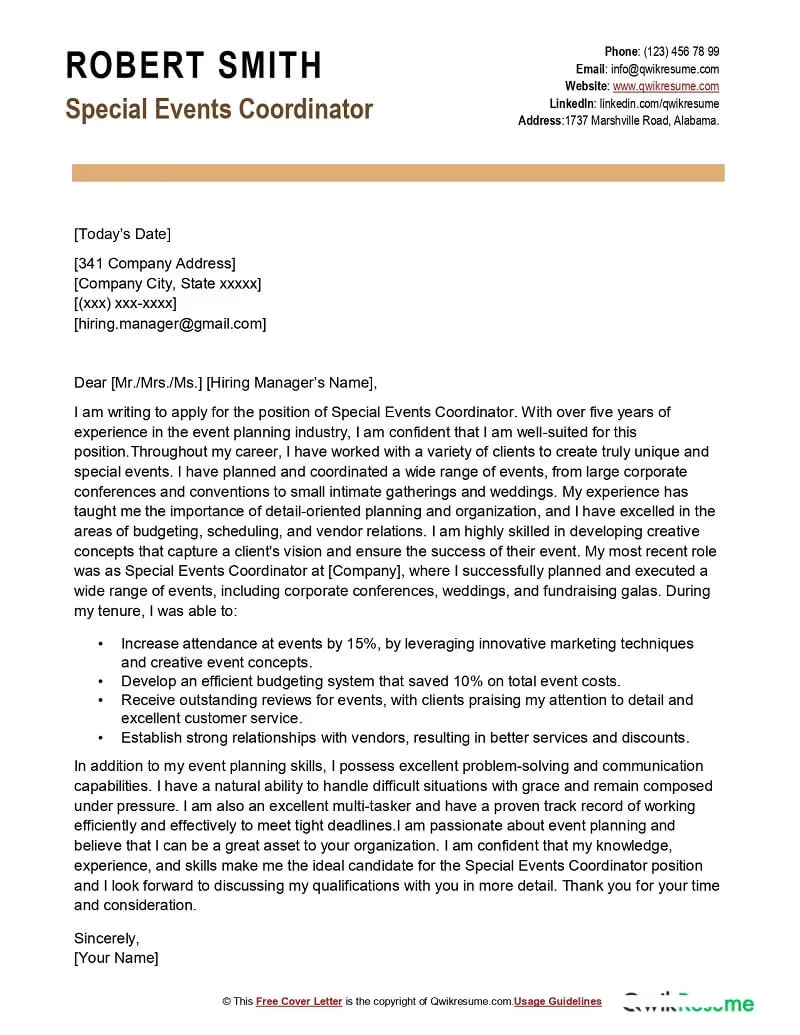Why a Great Cover Letter Matters for Special Events Coordinators
In the competitive world of event planning, a special events coordinator cover letter is your first chance to shine. It’s not just a formality; it’s a powerful tool that can significantly boost your chances of landing an interview. A well-crafted cover letter offers a concise yet compelling snapshot of your skills, experience, and enthusiasm, setting you apart from other applicants. It allows you to expand upon your resume, providing context and demonstrating your unique qualifications. Unlike a resume, which presents a factual overview, your cover letter lets your personality and passion for event planning come through. A strong cover letter can transform a simple application into a memorable introduction, making the hiring manager eager to learn more about you and your capabilities. This initial impression is vital because it shapes the hiring manager’s perception and determines whether they’ll take the time to delve into your resume.
Highlighting Your Skills
When writing your special events coordinator cover letter, it’s crucial to highlight the skills that make you a successful event planner. This includes a blend of hard and soft skills, showcasing your ability to both manage logistics and interact effectively with people. Begin by identifying the key skills required for the specific role, often found in the job description. Common skills include project management, budgeting, vendor negotiation, and problem-solving. Soft skills are just as important. Communication, both written and verbal, is vital for conveying ideas, coordinating with vendors, and interacting with clients. Leadership, teamwork, and time management are also critical for organizing and executing events efficiently. When describing your skills, don’t just list them. Provide specific examples that demonstrate how you’ve used these skills in past roles. This makes your claims more credible and shows the hiring manager how you can contribute to their team.
Showcasing Relevant Experience
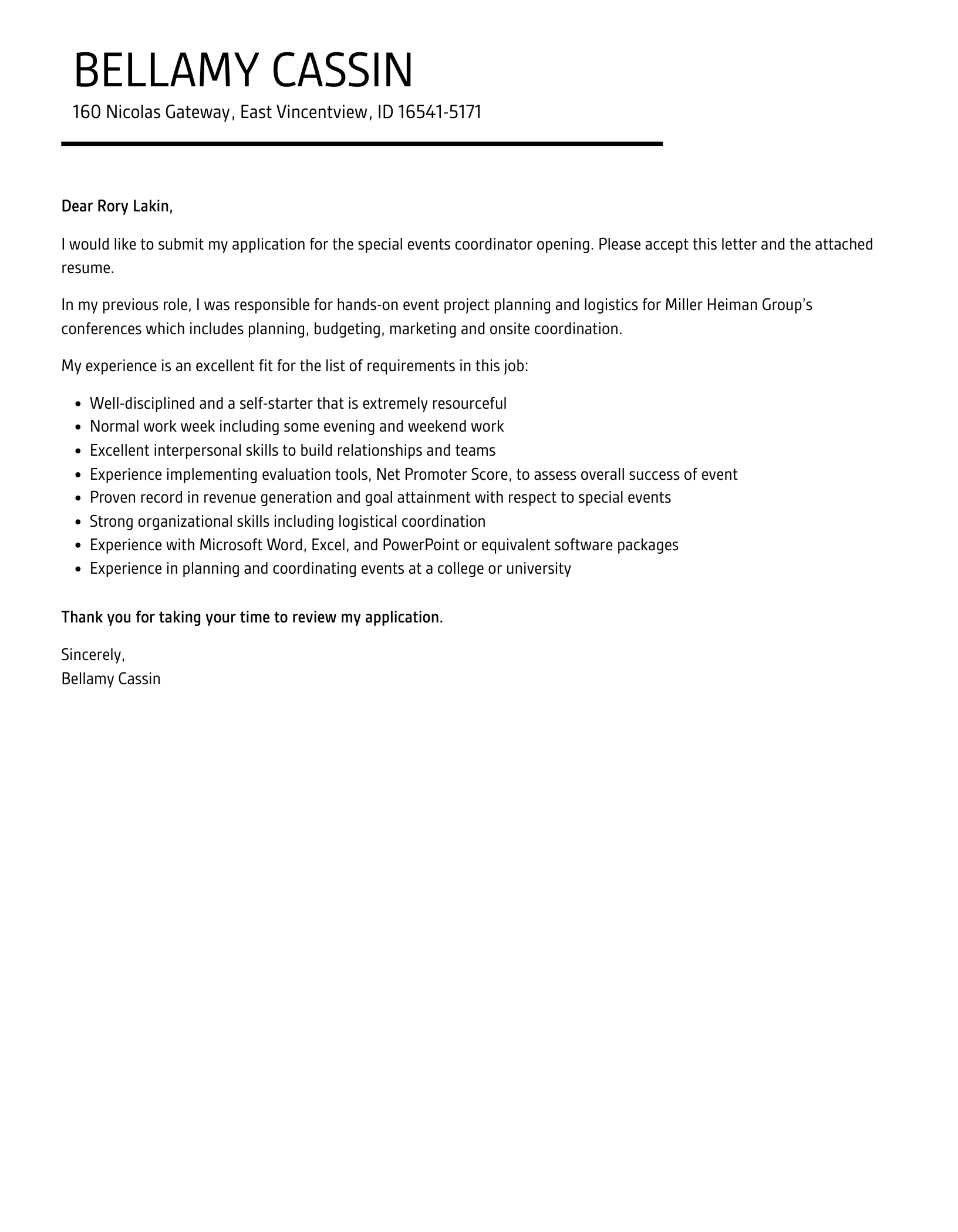
Your cover letter is the ideal place to elaborate on your event planning experience. Focus on experiences that directly align with the job requirements and the company’s specific needs. Start by briefly mentioning your past roles and responsibilities, then go into greater detail about your accomplishments. When describing your projects, be specific. Mention the type of events you’ve planned, such as corporate conferences, weddings, or festivals. Include details about the size and scope of the events, the number of attendees, and any unique challenges you overcame. This information helps the hiring manager understand your experience in context. If you have experience with a particular type of event or industry, such as corporate events, highlight this to show you can bring relevant expertise to the role. Make sure to use action verbs to describe your responsibilities and accomplishments. Phrases like ‘managed,’ ‘coordinated,’ ’negotiated,’ and ’executed’ make your descriptions more dynamic and engaging.
Quantifying Achievements
One of the most effective ways to make your cover letter stand out is by quantifying your achievements. Instead of just saying you improved event efficiency, provide specific data to back up your claims. For example, you might state that you ‘reduced event costs by 15% through strategic vendor negotiations’ or ‘increased event attendance by 20% by implementing targeted marketing strategies.’ Using numbers and percentages provides concrete evidence of your abilities and allows the hiring manager to see the tangible impact of your work. When quantifying your achievements, focus on the results that are most relevant to the job description. If the role emphasizes budget management, highlight any cost savings you achieved. If the role involves marketing, emphasize any improvements in event attendance or engagement. Always aim to demonstrate how your skills and experience have translated into positive outcomes for previous employers or clients. This makes your cover letter more persuasive and increases your chances of getting an interview.
Tailoring to the Specific Job
Generic cover letters are easily spotted and often discarded. To maximize your chances, tailor each cover letter to the specific job and company. Start by carefully reading the job description and identifying the key requirements and desired skills. Then, adjust your cover letter to reflect how your qualifications match those needs. This might involve emphasizing certain experiences, highlighting specific skills, or even using keywords from the job description. Research the company to understand its values, culture, and recent projects. This knowledge will help you demonstrate that you’re a good fit and that you understand the company’s goals. Mention specific events or initiatives the company has undertaken, and explain how your skills could contribute to their success. When tailoring your letter, be mindful of the tone and style. Match the company’s communication style and use language that reflects their brand. If the job description mentions a specific project or objective, address it directly in your cover letter. This shows that you’ve taken the time to understand the role and are genuinely interested in the opportunity.
Formatting Your Cover Letter
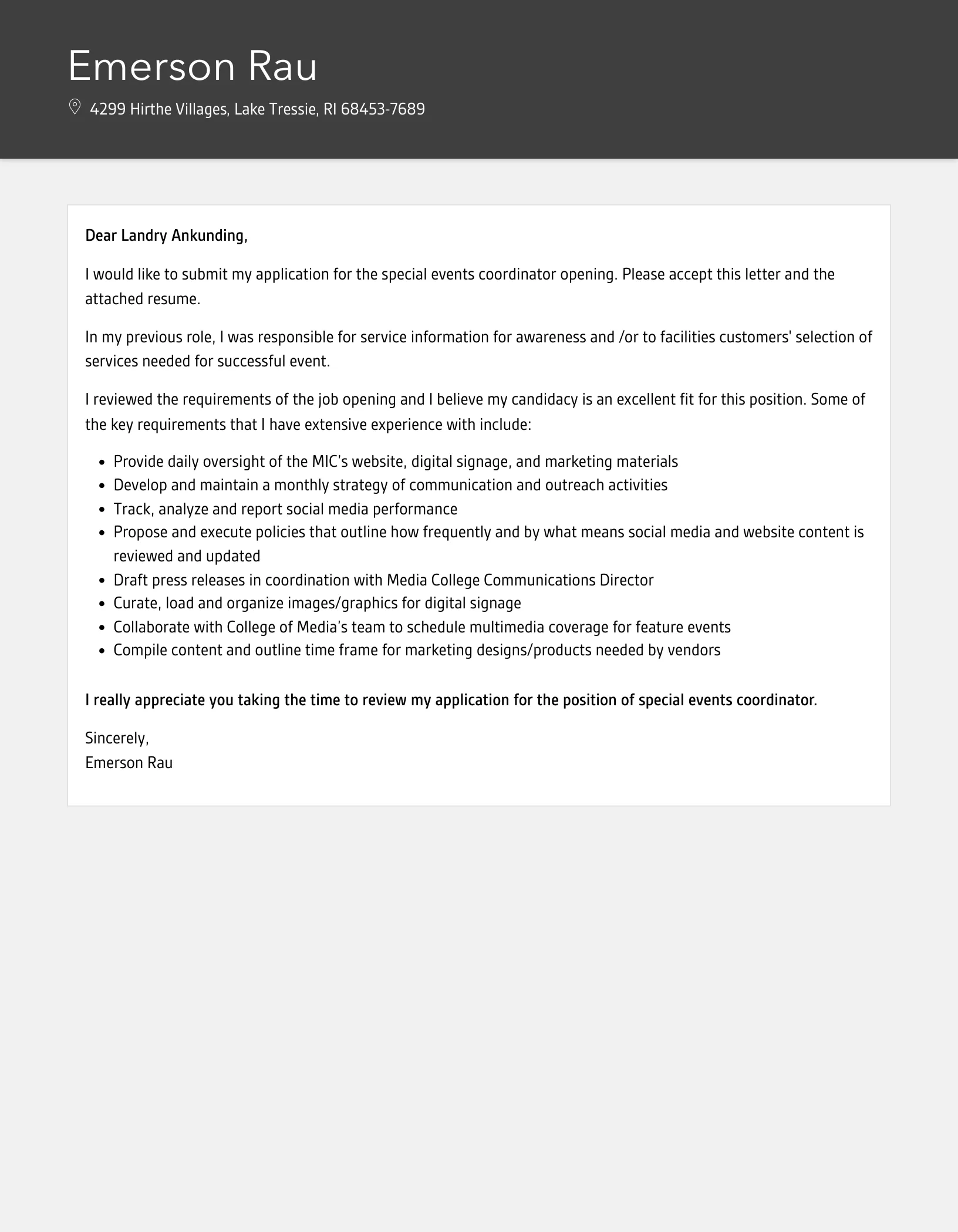
The format of your special events coordinator cover letter is essential for creating a positive first impression. A well-formatted letter is easy to read and demonstrates your professionalism. Start with a professional header that includes your contact information, the date, and the hiring manager’s name and address. This header provides essential contact details and shows that you’ve done your research. Use a clear and readable font, such as Arial or Times New Roman, with a font size of 11 or 12 points. This ensures that your letter is easy on the eyes and accessible to all readers. Structure your cover letter with clear sections and concise paragraphs. Use headings to separate the different parts of your letter, such as your skills, experience, and accomplishments. This structure makes it easy for the hiring manager to quickly find the information they need. Keep your paragraphs short and focused, with a maximum of four to five sentences. This keeps your letter from becoming overwhelming and helps the reader stay engaged. Proofread your cover letter carefully to ensure it is free of grammatical errors and typos. A polished and error-free letter demonstrates attention to detail and professionalism, important traits for an event planner.
Structure and Layout
The layout of your cover letter should follow a standard professional format. Begin with a formal salutation, such as ‘Dear Mr./Ms. [Last Name]’ or, if you don’t know the hiring manager’s name, ‘Dear Hiring Manager.’ The body of your letter should be structured into distinct paragraphs. The first paragraph should introduce yourself and state the position you’re applying for. The next few paragraphs should showcase your skills and experience, highlighting relevant achievements. Use bullet points to list key accomplishments and skills for easy readability. In the final paragraph, reiterate your interest in the position, thank the hiring manager for their time, and include a call to action, such as suggesting a meeting or interview. End with a professional closing, such as ‘Sincerely’ or ‘Best regards,’ followed by your signature (if printing) and typed name. Ensure consistent spacing throughout the letter, typically using single spacing within paragraphs and double spacing between paragraphs. This layout makes the letter easy to navigate and ensures that the reader can quickly grasp the key information.
Font and Readability
Choosing the right font and ensuring good readability are critical for making your cover letter accessible and professional. Select a clear, easy-to-read font like Times New Roman, Arial, or Calibri. These fonts are widely recognized and ensure that your letter can be easily read on any computer. Maintain a font size between 11 and 12 points for optimal readability. Avoid using fancy or overly stylized fonts, as they can be distracting and make your letter appear less professional. Use consistent formatting throughout your letter, including the font, font size, and spacing. This creates a unified and professional look. Ensure adequate spacing between paragraphs and sections to improve readability. Avoid cramming text together, as this can make your letter appear overwhelming. Use bolding to highlight important information, such as your name, job title, and key accomplishments. However, use bolding sparingly to avoid overwhelming the reader. Proofread your letter carefully to ensure that all text is aligned and formatted correctly. A well-formatted letter shows attention to detail and demonstrates that you care about presenting yourself in the best possible light.
Avoiding Common Mistakes
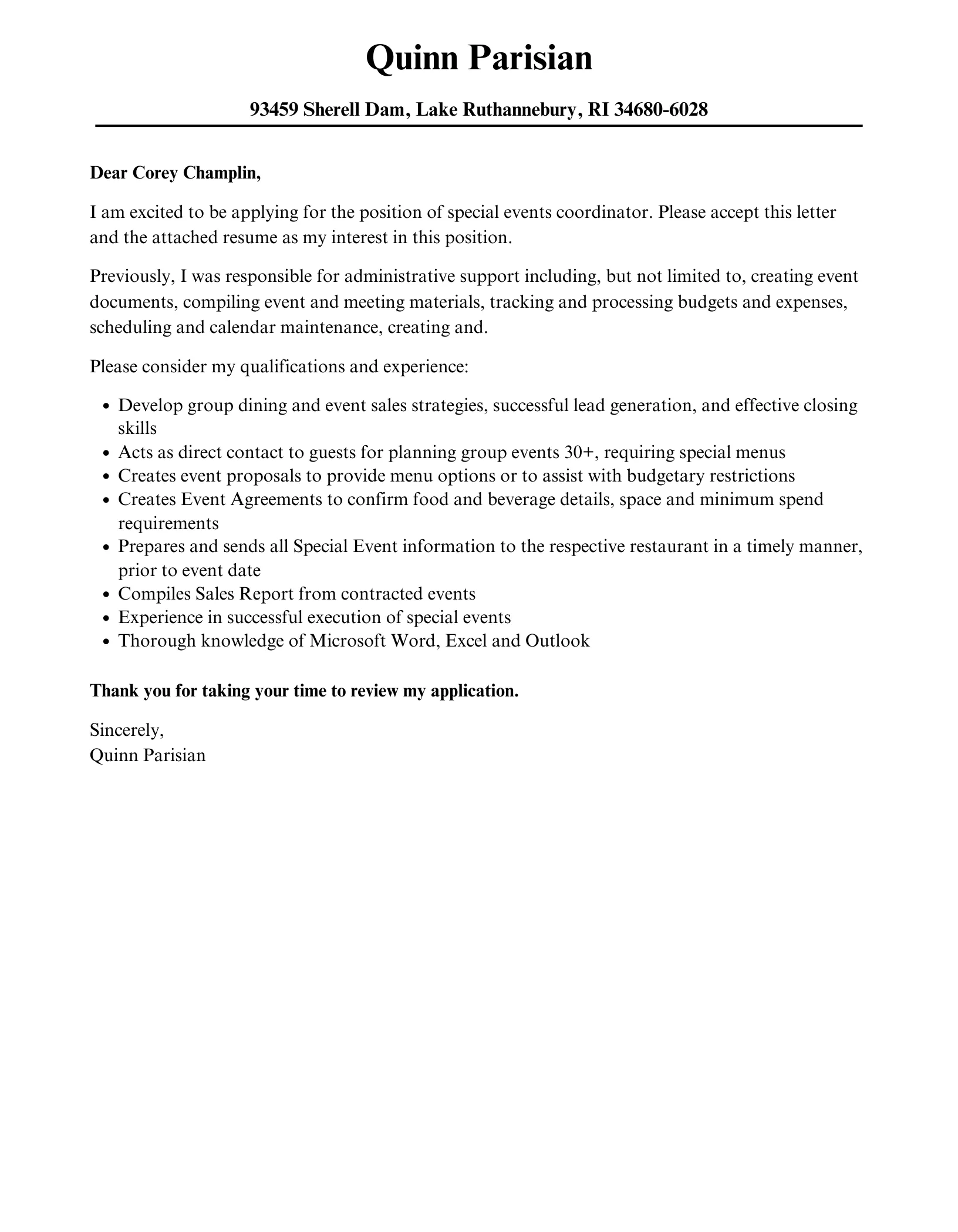
Certain mistakes can immediately disqualify you from consideration. Avoid these common pitfalls to ensure your cover letter makes a positive impact. One of the most significant mistakes is neglecting to proofread your letter. Errors in grammar and spelling can give the impression that you lack attention to detail, a critical skill for an event coordinator. Another common error is using a generic, one-size-fits-all cover letter. Tailor each letter to the specific job and company to demonstrate your interest and understanding of their needs. Avoid using overly casual language or unprofessional formatting. Your cover letter is a professional document, so maintain a formal tone and adhere to standard business letter conventions. Do not simply repeat your resume in the cover letter. Instead, use the letter to expand on your qualifications, provide context, and demonstrate how your skills and experience align with the job requirements. Finally, always address the hiring manager by name. Addressing the letter ‘To Whom It May Concern’ indicates that you haven’t taken the time to research the company or the position.
Typos and Grammatical Errors
Typos and grammatical errors are a significant red flag that can undermine your credibility. Even a single mistake can make you appear careless and unprofessional. Always proofread your cover letter multiple times to catch any errors. Use a spell checker and grammar checker, but don’t rely on them entirely. These tools can miss subtle errors or context-dependent mistakes. Read your cover letter aloud to catch awkward phrasing or unclear sentences. Reading aloud helps you hear how your words sound and identify any areas that need improvement. Ask a friend, family member, or career advisor to review your cover letter. A fresh pair of eyes can often spot errors that you’ve missed. Pay close attention to punctuation, especially commas, periods, and semicolons. Ensure that your sentences are well-structured and that your grammar is correct throughout the letter. Double-check the names and titles of the hiring manager and company to ensure accuracy. Errors in these details can give the impression that you don’t care about the application.
Generic Cover Letters
Using a generic cover letter is a missed opportunity to make a strong impression. A generic letter doesn’t show that you’ve taken the time to understand the job or the company. It also fails to highlight how your specific skills and experience align with the requirements. To avoid this, always tailor your cover letter to each job. Research the company, understand their mission, and identify any recent projects or initiatives. Highlight the skills and experiences that are most relevant to the specific job description. Use keywords from the job description to demonstrate that you understand the role’s requirements. Mention the company by name and show that you know something about their work. Personalize your letter by referencing specific events, projects, or initiatives that resonate with you. Demonstrate genuine enthusiasm for the opportunity and explain why you’re a good fit for the company. Take the time to make each cover letter unique, and your chances of getting an interview will greatly improve.
Focusing on the Employer
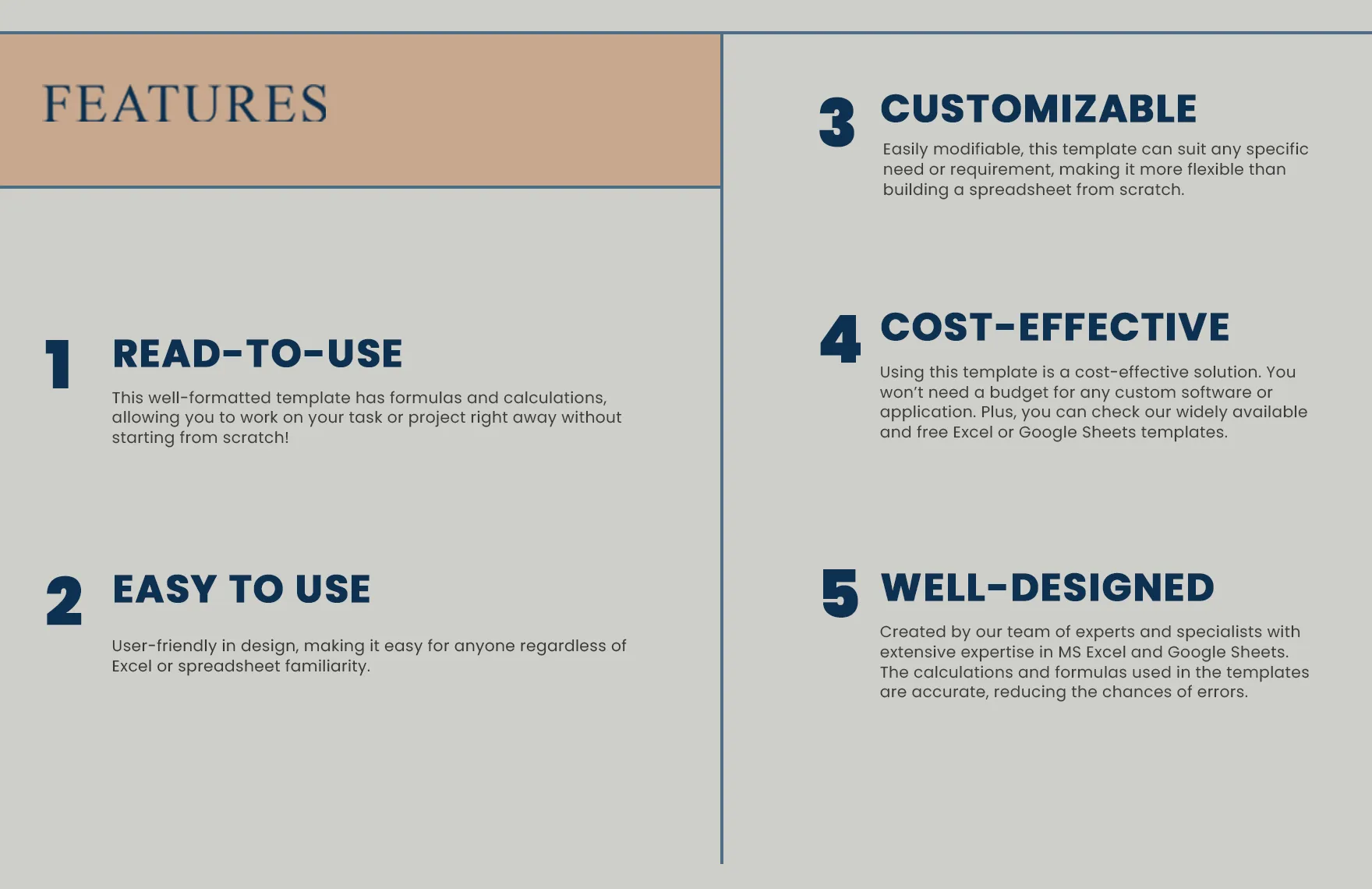
A successful special events coordinator cover letter focuses on the employer’s needs and demonstrates how you can contribute to their success. Avoid making your cover letter all about yourself. Instead, frame your qualifications in terms of how they benefit the company. Highlight the skills and experiences that align with the job requirements and the company’s goals. Show that you understand the company’s values and culture. Mention specific projects or initiatives that demonstrate your understanding of their work. Describe how you can help the company achieve its objectives. For example, if the job description emphasizes budget management, highlight your experience in controlling costs and maximizing resources. If the company is known for its innovative events, showcase your creative ideas and your ability to think outside the box. Tailor your language and tone to match the company’s brand. If the company has a modern and informal style, your cover letter can reflect that. If the company has a more traditional style, ensure your cover letter is formal and professional. This approach shows the employer that you are not only qualified but also a good fit for the team.
Researching the Company
Thorough research is crucial for writing a compelling cover letter. Knowing about the company, its events, and its culture allows you to tailor your letter and demonstrate genuine interest. Visit the company’s website to learn about its mission, values, and recent projects. Explore their social media profiles to understand their brand identity and see how they interact with their audience. Read news articles and press releases to stay updated on the company’s activities and achievements. Identify any specific events or initiatives the company has undertaken that resonate with you. Use this information to show that you understand the company’s goals. When you research the company, pay attention to the language they use in their marketing materials and on their website. This will help you match your writing style and tone to their brand. The more you know about the company, the better you can position yourself as a strong candidate. Demonstrating your knowledge of the company is an effective way to make a positive impression and set yourself apart from other applicants.
Demonstrating Enthusiasm
Showcasing your enthusiasm is vital for making a memorable impression. Your cover letter should convey your passion for event planning and your genuine interest in the specific role and company. Express your excitement about the opportunity. Highlight what attracts you to the role and why you’re excited about the company’s work. Mention specific events or projects that have inspired you. This demonstrates that you’ve taken the time to understand the company’s achievements. Use positive and energetic language throughout your letter. Avoid using generic phrases. Show, don’t just tell. Illustrate your enthusiasm with concrete examples of your previous successes. Describe your experiences and how you enjoyed planning and executing events. Explain how your skills and experience align with the company’s needs and why you believe you can make a valuable contribution. By conveying your enthusiasm, you can make a lasting impression and increase your chances of getting an interview. A passionate applicant is often more likely to succeed in the dynamic and demanding field of event planning.
Call to Action
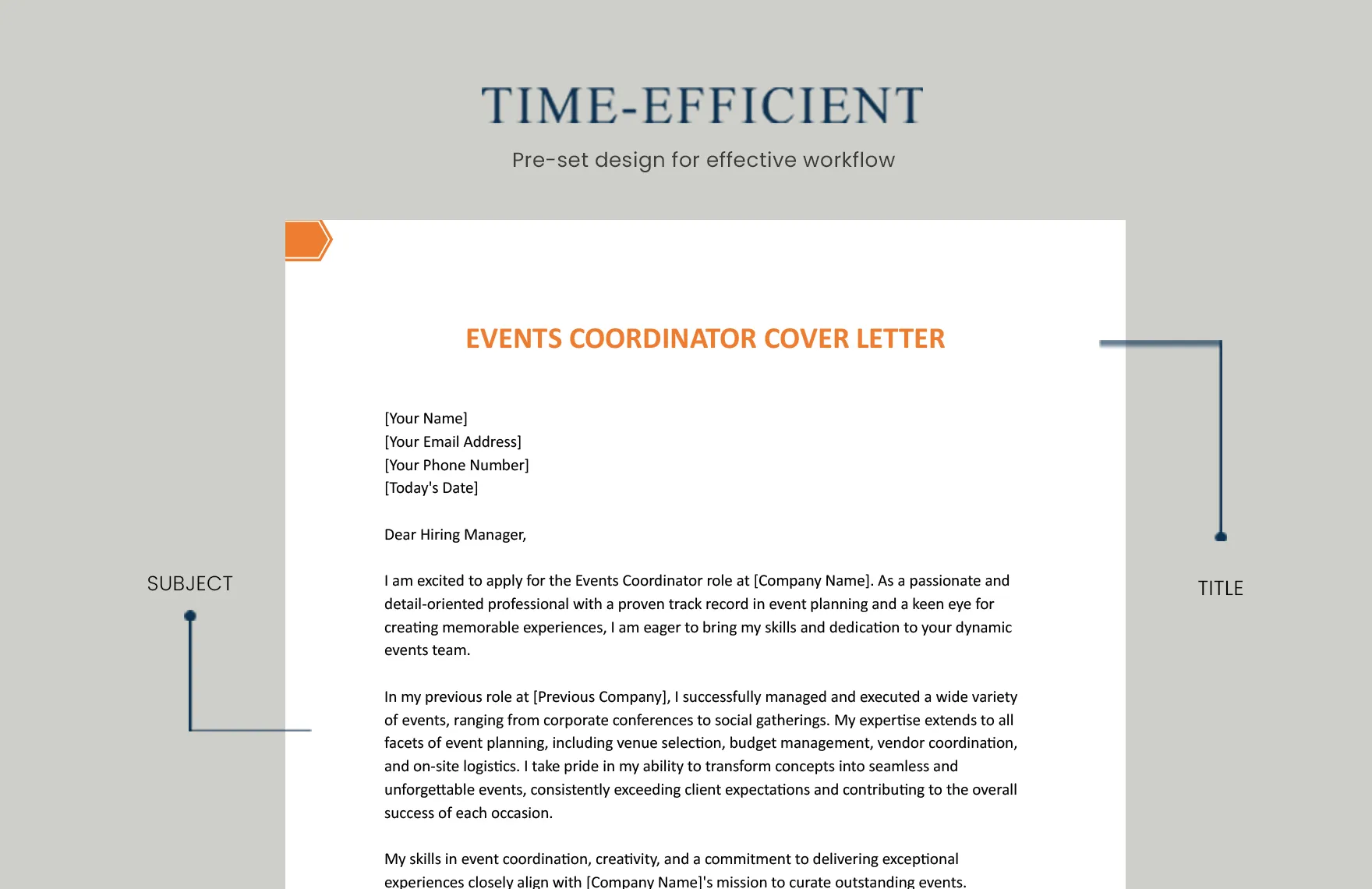
Your cover letter should conclude with a clear call to action. After you’ve highlighted your skills, experience, and enthusiasm, make it easy for the hiring manager to take the next step. Reiterate your interest in the position and express your desire to learn more about the opportunity. State your availability for an interview and suggest a specific timeframe. This demonstrates your proactive approach and makes it easier for the hiring manager to schedule a meeting. Thank the hiring manager for their time and consideration. Expressing your gratitude shows that you respect their efforts. Include your contact information, such as your phone number and email address. This ensures that the hiring manager can easily reach you to discuss the opportunity further. A strong call to action leaves a positive final impression and increases your chances of moving forward in the hiring process. By including a clear call to action, you actively encourage the hiring manager to reach out and consider your application.
